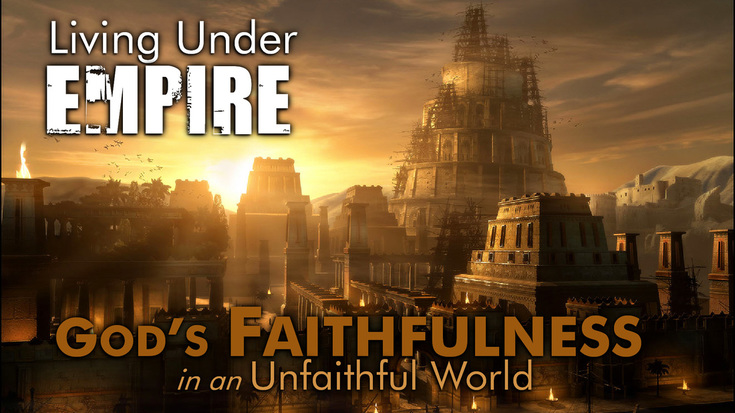|
In Zechariah 3:1-3, Satan, the accuser, is standing beside Joshua, the very human high priest who is sinful and clothed in filthy robes. He is ready to accuse Joshua for his sins, when the Lord intervenes and says,
“The Lord rebuke you, Satan! The Lord, who has chosen Jerusalem, rebuke you! Is not this man a burning stick SNATCHED from the FIRE?” God planned to save and redeem Joshua--ultimately by sending Jesus (Jesus is the Greek version of the name Joshua) to be a perfect high priest and king. Satan was only there to hurl insults, shame, and accusations. He saw no value in Joshua. But God did. He deserved death, but God saved him by his grace, as a "burning stick snatched from the fire." There is a great sermon illustration for this passage (or any other passage on God's grace and redemption) found in this story - JOHN WESLEY - A BRAND PLUCKED FROM THE FIRE! When he was five, John Wesley's house caught on fire. It was not until the last moment that he was saved from the fire. And John Wesley believed that, like Joshua the high priest, God had saved him for a purpose. He would go on to overcome fear and failure to preach thousands of sermons across the US, helping to usher in the First Great Awakening through his preaching, teaching, and church planting. Who does this have application for? All who have been beaten down by Satan and the world and made to feel worthless--and all who have no hope for the future changing. It could apply to:
If God cared enough to save Joshua and John Wesley, does he not care enough to save when we need his salvation?
Fasting--what is that? And why should we do anything so seemingly ridiculous? What does going without food have to do with one's spiritual life? Why is it considered to be a spiritual discipline? And how do we preach on this subject in today's culture?
Well, when in American culture do we EVER practice self-denial, self-control like this? We are in a Super Size me culture. The microwave culture. The instant gratification culture. And as the above SuperSize Me video shows, the results are not pretty, either physically or spiritually. Think--why is Apple now the largest company in the world? Yes, they have great products and fabulous designs. But they are also the largest company in the world because they have tapped into impulsive desires. Apple knew that if they could make it where people could buy a song or album that they just heard for $1/$10--or put out a new phone each year that people had to have--they would make a lot of money. And they have. Fasting and self-denial is counter-cultural. And for that reason, we need it even more. Our focus upon ourselves and instant gratification shows up in our credit card debt, affairs, and what we eat. Fasting teaches us that we can wait, that our cravings do not control us, that God is above all. There are numerous passages on fasting, and fasting is almost always linked to PRAYER. Jesus himself fasted before facing temptation (Luke 4:2). And while physically weak, if fasting draws us closer to God, he may have been spiritually strong THEN--maybe even fasting so as to be able to face Satan's temptations. Jesus also says, "when you fast..." (Mt. 6:16f). I think that what Dallas Willard said about the spiritual disciplines of solitude and silence--you practice these, so that when you need to be silent you can be--can be applied to fasting. Fasting is a form of self-denial, and we practice this in fasting so that when we are called to self-denial, we have practiced this and have asked God's help in this. Finally, I think that 1 Corinthians 9:24f is a good passage/approach to this subject when preaching: "24 Do you not know that in a race all the runners run, but only one gets the prize? Run in such a way as to get the prize. 25 Everyone who competes in the games goes into strict training. They do it to get a crown that will not last, but we do it to get a crown that will last forever." Fasting is a type of training of our body, mind, and spirit, not as an end goal, but as a way to help us in drawing closer to God and for our sanctification as we seek the prize of eternal life. What are your thoughts on fasting? As Christians in America, we have long benefited from being under “Christendom”—the protection of and goodwill towards Christianity by the State and society at large. Today, however, those protections and this goodwill is breaking down. From changing poll numbers to changing laws to recent Supreme Court rulings, it is clear that we are living in a society that increasingly is moving away from Christian values and a Christian worldview.
We all probably feel the angst and loss from this change in society. We worry about the world in which our children are growing up in. We fear for our future, our jobs, our security, and we mourn for our nation. While all of this is new and difficult for us, this state of being was the norm for God’s people at various times throughout their history—from being slaves in Egypt to exiles in Babylon to Christians under the Roman Empire. The book of Daniel is a great book of the Bible from which to learn how to deal with the changing culture in which we find ourselves today. It is a book which chronicles some of God’s people while they lived as exiles under the Babylonian Empire. Daniel and his friends faced unjust laws, ungodly politicians, proud and unreasonable kings, and overt persecution. What lessons can we learn from this? Let's look at the different major stories of the book of Daniel.
What lessons can we learn from Daniel in dealing with Empire issues?
What issues/themes do you see in the book of Daniel which are helpful in dealing with "Empire" issues today? What lessons can we learn from these? |
Search this site for a topic or message illustration or click on the categories below!AuthorDr. James Nored (Doctor of Ministry, Fuller Theological Seminary) is a preacher, evangelist, church consultant, writer, and missional leader located in Fairfax, Virginia, a suburb of Washington, D.C. Categories
All
Recent Posts
Could Good Preaching/Storytelling Bring Happiness? The Power of Threes in Rhetoric If Your Sermon Does Not Contain These Two Things, It Will Fall Flat Why No One Watches Your Sermon Online--and 3 Ways How to Change This Archives
June 2016
|


